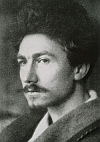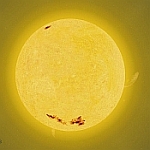February 25th, 2010

People find ideas a bore because they do not distinguish between live ones and stuffed ones on a shelf.
Ezra Pound
I waited anxiously for the termination of my fit so that I might at once make notes for a paper on the subject.
Alfred Russel Wallace
Classifieds
For rent: snow shoes. Must be worn only in temperatures below 0°C or 32°F. Mens and women's sizes available. Box 11.
Get ready for spring! I have for sale some slightly used exorcise equipment. Vials of holy water, crucifixes in a variety of sizes, long purple stoles and a variety of albs. All reasonably priced. Box 666.
For sale; one cracker I found by my bed Sunday morning. Still whole. Some lint. Seven dollars OBO. Box 2.
Monkeys! C'mon to Larry's House of Monkeys on Regent Avenue West! We've got all kinds of monkeys to fulfill your monkey needs. Just in from South America, a whole whack of Ateles geoffroyi !!! Many price points represented.
Don't forget Friday, Febrary 26th is National Mispell Febooary Day!
The Mystery of the Lost Lenore
Listen to Part Forty-Five

Click on the picture. (4:27)
Archives
Links
This would be our email address:
persiflagemag@hotmail.com
If we had one. And we do. So it is.
Want a weekly reminder to check out Persiflage's updates? Send us an email with "Please Remind Me" in the subject line. Already receiving our weekly missives? Then don't send us one of those messages because we're not sending you two.
ELA
A Troubadour Song

Due to the overwhelming rise in interest in Medieval music and poetry amongst today's youth and not wanting to be left behind, we feel we must present here an authentic troubadour song of the 13th Century. It was written by the little known Provencal poet Édouard de Préjeanfils, and it has been translated, somewhat freely, from the original Occitan by our own Hugh Briss who often surprises us with the languages he claims to know.
I
I haven't seen the sun in days.
The sky's an endless series of greys
that match the brueghelsy trees and dirty snow.
I sit at home. Nowhere to go.
It is the bleak midwinter and
the icy street's sprinkled well with sand.
And I take matters well in hand
eating only foods that are well canned.
II
Ah, she is...
she is,
somewhere other than with me.
Somewhere, sweeter than the honey of the bee
she is. She is sweeter than
any man can stand
or, indeed, any wo-man.
Suffice to say, I am a fan.
III
O you sweet girl you
your sweetness runs me through
a frantic three-legged race
at an outrageous pace
till my heart aches
and I must put on the brakes
because it takes and takes
and my ah... thirst never slakes
IV
I wouldst woo her
giving her, a fur
if I had one.
Alas I have none.
But I can give her all
that I call
my own and in the fall
cut down a tree that's very tall.
V
I know not
if you've ever caught
a glimpse of me
and didn't see
neath this exterior
someone superior
to the peer of your
average suit-ior.
VI
Jongleur, I say this to you
whatever else it is you do,
keep it light
and bright
and somewhat airy
if some girl you want to marry.
Else it's you they'll bury
long afore with her, you get to tarry.
Édouard de Préjeanfils
(trans. H. Briss)

The Shirtsleeves Philosopher
Because we here at PERSIFLAGE are all about the edification, we present The Shirtsleeves Philospher, Graham Craquar. Mr. Craquar is not a professor anywhere nor does he hold a degree from any recognized university (he is, in fact, a shipping clerk) but his grasp of basic philosophical principles, although surpassed by many, is unparalleled. This week Mr.Craquar looks at the problem of ontology and what to do about it.
To begin with let us define our terms. Ontology, from the Greek word "ontos" meaning 'being' and "logos" meaning 'word', is, literally, 'words about being' or 'ontology'. Is that clear? Therefore whenever we speak or write (or I guess, sing) about being (the act of being that is, not beings as in aliens or that sort of thing) we are engaged (although perhaps not seriously) in ontology. Now, why would we choose to do so?
Since the beginning of history (and perhaps even earlier) Man has been concerned with his place in the universe. He has been worried that perhaps reality was all some sort of elaborate ruse designed to make him look like an ass (today adherents of this view are known as 'realists') and so he has spent an inordinate amount of time trying to prove that this is not the case. With little success, I might add.
Some of the greater ontologists of the past have realized that this was a fool's errand and that their real work consisted of distracting man from questioning his moral and ethical behaviour by constructing elaborate and showy philosophies designed to obfuscate the question of what he was doing here in the first place. By concentrating on the how of why one could fairly successfully avoid the question of why the how. Is that clear?
Gurman Telephromto, the Milanese Hypochondriac (as he is often referred to), posited, in 1464, that Man was, in fact, not a man at all but a mouse (hence the common expression) and that his true purpose in life was "to find the cheese" and "avoid the cat". Unfortunately Telephromto was unable to do either and was eaten by a leopard in 1470. His philosophy had few adherents but those around today are easily distinguished by their scurrying and their skill at navigating mazes.
Holst von Heroiconimagen, the Silesian Water Chestnut (as he was known for no good reason), was a sixteenth century knob polisher in the city of Breslau (Wroclaw, now) who believed that the earth, man and thirty-seven per cent of the plant life had been created by a star-nosed mole named Vincent in a vain attempt to impress his girlfriend (the mole's not Heroicon- imagen's). His philosophy had even fewer adherents than Telephromto's but Heroiconimagen was more popular during his lifetime because he threw such good parties (he always had a cheese log).
In the nineteenth century, Sir Phipps Blendermanque (pronounced bland ear monkey) developed the idea that man was truly indistinguishable from the rest of so-called reality and in fact, could easily be construed as a goat or carrier pigeon if you squinted really hard. According to Blendermanque, there was nothing at all special about man and he should start trying to get over himself.
Man, flora, fauna, air, everything, posited Sir Phipps, was in fact part of a giant web of being (that he called "The Web of Being") formed in the mind of all of us in order to avoid doing the dishes. The fact that some of us still have to do the dishes seems to have escaped Blendermanque but this realization may, in part explain why his philosophical system never really took off. In our own time several different ontological arguments have been advanced but none of them were really very interesting and besides I've run out of room.
G.Craquar